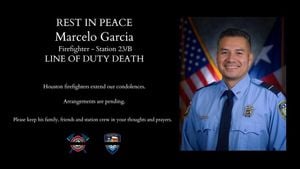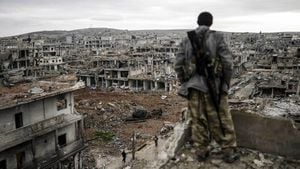Protests erupt across Canada as families and communities demand justice following police-related deaths involving Indigenous individuals. Recent tragic incidents have ignited outrage and calls for substantial changes to law enforcement practices, highlighting systemic issues and longstanding grievances against police brutality.
On Thursday, approximately 100 residents from the Norway House Cree Nation rallied outside their local Royal Canadian Mounted Police (RCMP) detachment to honor 17-year-old Elgyn Muskegowas, who was shot dead by police just days earlier. Authorities claim the teen brandished a weapon and failed to comply with their orders before being shot during the incident on March 15. Yet community members expressed frustration, insisting there were alternative ways to manage the confrontation without lethal force.
Jonathan Meikle, advocating for Muskegowas’s family during the gathering, spoke to the need for unity. “We need our people to know... we need to come together and work together. That we're all part of this collective healing and there’s a lot of work to be done,” he articulated. The grief felt by the community resonates with calls for systemic change.
Norway House Chief Larson Anderson emphasized the necessity for the community to establish its own police force as a solution. “The solution is our own police force, not only because we can do a much more effective job, but because we would have sustained involvement of our membership to police itself,” he argued. Anderson underscored the importance of self-governance and the need for culturally-rooted approaches to law enforcement.
Meanwhile, Manitoba's Independent Investigation Unit has taken charge of the inquiry surrounding Muskegowas’s death, and his community has initiated its own investigation as well. Calls are intensifying for governmental support to bolster mental health infrastructure and community-led responses, reflecting deep-rooted frustrations among Indigenous communities over police interactions.
Across the province of Quebec, another demonstration saw families gather to demand accountability from the Nunavik police following the shooting of twins Joshua and Garnet Papigatuk on November 4, 2023. Joshua was killed, and Garnet suffered serious injuries during the police altercation. Approximately 50 individuals marched through the streets of Montreal, echoing sentiments of sorrow and advocacy for justice. Placards reading “Justice for the twins” and “Don’t shoot” marked the occasion, as demonstrators called attention to the concerning trend of violence against the Inuit community.
Courtney Papigatuk, the twins’ relative, lamented the loss of her cousin Joshua, pointing out the devastating effect the incident has had on the family. Acknowledging the depth of the grievances, she stated, “Both Joshua and Garnet are very loved, very happy people... to end lives like theirs is really sick.” These protests aren’t just isolated incidents but rather part of a larger movement seeking to address the underlying issues of police violence against Indigenous populations.
The statistics are alarming — data from Quebec’s chief coroner between 2000 and 2018 highlight Nunavik having more police-related fatalities than Canada’s three territories, which raises significant questions about the safety and efficacy of law enforcement within these communities.
Investigators from Quebec's Bureau des enquêtes indépendantes (BEI) have launched inquiries to examine the circumstances surrounding the Papigatuk shooting, with preliminary findings indicating police were responding to reports related to impaired driving. Eyewitness accounts diverge, with some disputing the official narrative about the use of tasers and pepper spray during the confrontation.
This outcry is compounded by voices advocating for systemic reform. The mishandling of recent tragedies highlights the deficiencies currently existing within the approach to police wellness checks. Leaders like MP Lori Idlout has emphasized the urgent need for additional de-escalation tactics and culturally-sensitive crisis intervention teams, making clear the intersection of systemic racism and ineffective policing practices.
A community-driven initiative seeks to redirect funds from traditional punitive measures toward health-centered alternatives, fostering grassroots activism. President of the Norway House Cree Nation, Chief Anderson, also pointed to improving conditions by strengthening existing community services.
Organizations advocating for Indigenous rights, such as the Assembly of First Nations, have reiterated the importance of re-evaluated police training and responses. They assert social workers and community leaders should be engaged more comprehensively to positively influence outcomes during police interactions.
Vigils and rallies, illustrating unmistakable solidarity across Canada’s Indigenous communities, have already yielded substantial engagement from various organizations and social media campaigns, including: #JusticeForElgyn and #JusticeForJoshua. Each gathering bolsters public awareness and cements the urgency for transformative changes within law enforcement.
The feeling of mourning among the indigenous communities is palpable, yet so is the resilient spirit to illuminate these realities for broader Canadian society. The resolve for justice persists as family members gather strength from one another, determined to seek rightful accountability and change the narrative around police violence.
Whether grinding through the legal systems or calling for legislative reform, activists and families remain united with one goal: to stop the incessant tragedies and hold law enforcement accountable for their actions. Elgyn Muskegowas’s name, alongside Joshua and Garnet Papigatuk’s, will continue to ring out across the streets of Canada until real change is achieved. “When we don’t address the root issues, it’ll just continue to happen,” Meikle cautioned, stressing the necessity of breaking this tragic pattern.
Every protest and every call for accountability contributes to building momentum against police brutality. A sacred fire lit for the victims signifies not just the pain of loss but also the warmth of hope, community, and the relentless pursuit of justice for those tragically silenced.
It’s evident from the activism occurring within Canada, particularly from Indigenous populations, the challenges posed by systemic biases and historical inequities demand immediate attention. Families and communities grappling with loss now unite to demand the systemic changes needed to prevent future tragedies from occurring. The reverberations of these incidents continue to resonate, marking Canada’s fight against police brutality and the quest for restorative justice.



